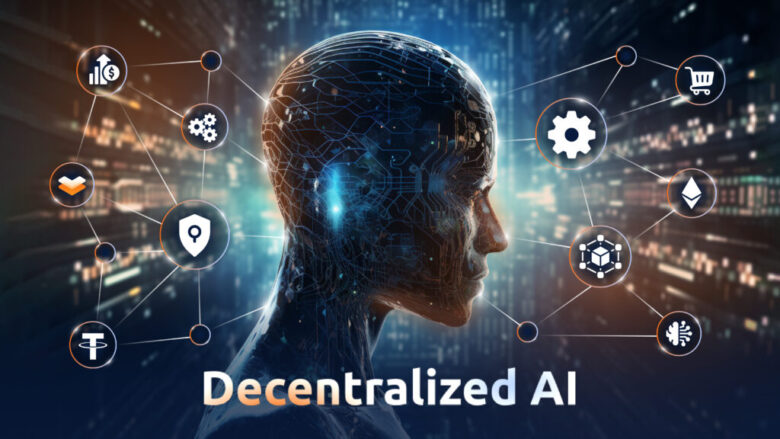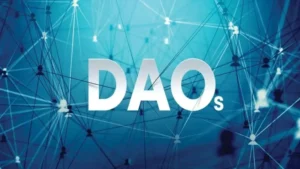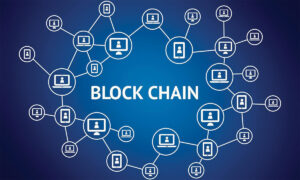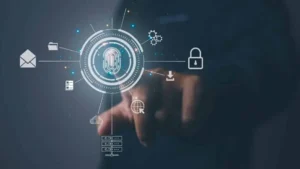While artificial intelligence (AI) is revolutionizing many industries, its reliance on centralized systems also raises concerns about privacy, security, and control. Decentralized AI offers a viable alternative by distributing machine learning operations across multiple nodes and minimizing reliance on any single entity. This strategy can mitigate risks such as bias and censorship, prevent data monopolies, and increase transparency and openness.
Decentralized AI can democratize access to powerful algorithms while protecting user data through peer-to-peer networks and blockchain technology. However, challenges such as computational overhead and unclear regulations remain. This article explores whether decentralized AI has the potential to create a safer and fairer future for machine learning.
Understanding Decentralized AI and How It Works:
Decentralized AI shifts power from large tech companies to a decentralized network of participants. AI models are developed and executed on numerous independent nodes instead of centralized servers; blockchain technology is often used to ensure security and transparency. Federated learning enables collaboration between devices without exchanging raw data, while smart contracts enable decision automation. The structure of AI systems makes them more resistant to manipulation and attacks, reducing single points of failure. Decentralized AI gives users control over their data and utilizes advanced machine learning techniques by eliminating intermediaries.
Key Advantages of Decentralized AI over Traditional Systems:
Enhanced privacy is a key advantage of decentralized AI, as data is stored on the user’s device instead of in a vulnerable central database. It also reduces bias because no single entity controls the algorithm or training data. Furthermore, decentralized networks can enhance security by making it more difficult for hackers to exploit a single point of entry. Censorship resistance is another advantage; decentralized AI models are difficult for companies or governments to monitor or block. Finally, this strategy stimulates innovation and allows developers from around the world to participate without being restricted by monopolies or corporate regulations.
Limitations and Challenges of Decentralized AI:
Despite its enormous potential, decentralized AI also faces many obstacles. Training complex models in a decentralized network requires significant computing power, which can be costly and energy-intensive. Coordination between nodes can slow down operations compared to centralized systems. Another issue is regulatory uncertainty, as it is difficult for governments to classify and regulate decentralized technologies. Moreover, ensuring the correctness and consistency of models across multiple data sources remains a challenge. Lacking appropriate incentives, the inability to maintain a network of honest and engaged participants can hinder the long-term success of decentralized AI.
Practical Applications of Decentralized AI:
Many projects have explored decentralized AI in practice. Ocean Protocol facilitates secure data exchange for AI training while simultaneously protecting ownership. Through a blockchain-based marketplace, SingularityNET enables developers to produce and market AI services. Bittensor uses decentralized reward mechanisms to stimulate collaborative machine learning. Healthcare entrepreneurs are testing another technique, federated learning, to train diagnostic models based on patient data without compromising privacy. These examples demonstrate how decentralized AI can transform industries while simultaneously addressing safety and ethical issues.
The Role of Blockchain in Decentralized AI:
Blockchain technology is essential for the development of decentralized AI by providing transparency, security, and trusted collaboration. Smart contracts ensure fair compensation by automating agreements between AI developers and data providers. When tokenization is implemented, participants have an economic incentive to contribute computing power or high-quality datasets. Moreover, immutable ledgers facilitate auditing of AI judgments, improving the traceability of algorithms. However, unless more effective solutions are developed, the scalability issues and high transaction fees of some blockchains could hinder their widespread adoption.
Social and Ethical Implications of Decentralized AI:
Decentralized AI can weaken the dominance of giants by democratizing access to powerful technologies. It can also help prevent abuse, as decentralized control makes it more difficult for malicious actors to manipulate AI systems. However, ethical issues remain, such as how to ensure the fairness of decentralized decision-making and how to prevent malicious applications such as deepfakes. To balance innovation and accountability, regulatory structures and public education are essential. When used correctly, decentralized AI has the potential to create a more equitable digital future.
The Promise of Decentralized AI in Machine Learning:
We expect an increase in demand for decentralized alternatives as AI becomes more widespread. The development of edge computing and lightweight blockchain solutions can address current scaling challenges. The transition phase could be a hybrid model that combines the security of decentralization with the efficiency of centralization. Decentralized AI has the potential to transform future sectors such as healthcare, banking, and governance by promoting safe, cooperative intelligence. But the key to success lies in building public trust and overcoming technical, financial, and regulatory barriers.
Conclusion:
Decentralized AI is a bold step towards a more transparent, secure, and democratic future for machine learning. It mitigates risks such as bias, censorship, and data monopoly by distributing control across networks. While challenges like regulation and scalability remain, new developments in federated learning and blockchain are opening up new possibilities. As society seeks alternatives to the dominance of centralized AI, decentralized models paint a compelling picture of a world where technology benefits everyone, not just a few. The potential for a more equitable AI ecosystem is clear, but this is just the beginning.
FAQs:
1. How does decentralized AI protect user privacy?
Compared to centralized systems, decentralized AI reduces the risk of data breaches and misuse by processing data locally or encrypting shared data.
2. Is decentralized AI as effective as traditional AI?
Decentralized AI may currently lack speed and scalability, but the development of edge computing and blockchain technology could eventually help close this gap.
3. Who controls decentralized AI models?
Decisions are typically made by network participants collaboratively and guided by smart contracts and consensus processes, rather than by a single organization.
4. Which sectors will benefit most from decentralized AI?
Healthcare, finance, and the Internet of Things (IoT) will benefit most due to the need for secure, private, and unbreakable AI solutions.
5. Can decentralized AI be manipulated?
While decentralized AI is more resilient than centralized systems, it still requires strong governance to prevent unwanted node behavior and Sybil attacks.




